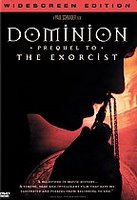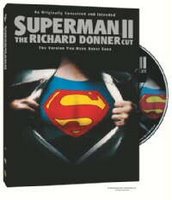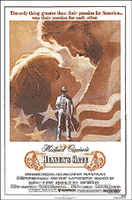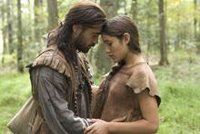 PAYBACK
PAYBACKThis 1998 Mel Gibson revenge flick seems an unlikely candidate for this article, since it was greeted with indifference and seemed to be a quick studio moneyspinner. But Brian Helgeland’s adaptation of Donald Westlake’s novel The Hunter (previously filmed as Point Blank with Lee Marvin) actually had grander, darker goals before he was removed from the director’s chair and 30% of the film was reshot by production designer John Myhre (although some say by Gibson himself), allegedly to make Gibson’s character more likable and the project less risky.
Payback was Helgeland’s first film as director after a string of successful screenwriting assignments (he would later direct A Knight’s Tale and script Mystic River), and he sought to make a pulpy but smart film noir with a genuinely amoral protagonist, and this was largely how the film was publicised, despite the reshoots having sanitised the true intensity of Helgeland’s vision. Their scale was such that a completely new villain was introduced, played by Kris Kristofferson, as was an entire kidnapping subplot. To add insult to injury, Helgeland was fired during post-production only one day after winning an Oscar for his L.A. Confidential screenplay.
Thankfully, Payback: Straight Up – The Director’s Cut is coming to DVD in the US in April. According to Harry Knowles at Ain’t It Cool, Helgeland has waited until no single executive who had been involved with the reshoots remained at Paramount, and hopefully his patience will yield a new appreciation for his film; perhaps it will be regarded as a distinctive vision rather than a bland studio concoction. Clocking in at 90 minutes – 10 shorter than the theatrical cut – Payback will either reveal itself as merely average in a new way or an unseen crime classic. The original version certainly has its supporters, such as Knowles in his open letter to Paramount. Helgeland is also interviewed on the new cut here.
EXORCIST: THE BEGINNING
Another entry, another director firing. After the success of an extended version of William Friedkin’s The Exorcist in cinemas, Morgan Creek Productions decided to put a new instalment into production despite the tepid reception of the two existing sequels. John Frankenheimer was hired to helm a prequel chronicling the Father Merrin character’s first encounter with Satanic forces in post-World War II Africa. When Frankenheimer died during pre-production, Paul Schrader, director of Mishima and American Gigolo and writer of Scorsese’s Taxi Driver and Raging Bull, was brought in to replace him. Schrader typically worked on the Hollywood fringe, so his taking on a franchise film came as a surprise.
 Schrader wasn’t phoning the film in though, as became clear when Morgan Creek saw his initial cut and were horrified by the lack of gore and traditional ‘scares’. Schrader had delivered a thoughtful contemplation of good and evil in the light of Christian ideologies, and production head James G. Robinson believed that his summer slam-dunk was down the tubes. Schrader was promptly fired from the film and Renny Harlin, he of Cutthroat Island and Deep Blue Sea, was appointed as the project’s third director to reshoot certain scenes. Actors were recast (except for Stellan Skarsgard as Merrin), the script rewritten, and ultimately, the entire film reshot despite an initial mandate of only conforming Schrader’s work to more mainstream horror film conventions. Exorcist: The Beginning was released to mediocre box office in August 2004.
Schrader wasn’t phoning the film in though, as became clear when Morgan Creek saw his initial cut and were horrified by the lack of gore and traditional ‘scares’. Schrader had delivered a thoughtful contemplation of good and evil in the light of Christian ideologies, and production head James G. Robinson believed that his summer slam-dunk was down the tubes. Schrader was promptly fired from the film and Renny Harlin, he of Cutthroat Island and Deep Blue Sea, was appointed as the project’s third director to reshoot certain scenes. Actors were recast (except for Stellan Skarsgard as Merrin), the script rewritten, and ultimately, the entire film reshot despite an initial mandate of only conforming Schrader’s work to more mainstream horror film conventions. Exorcist: The Beginning was released to mediocre box office in August 2004.Of course, film fans lurked as a spectre of pressure on Morgan Creek and Warner Bros. at the news that a studio had fired a quality director, so Schrader’s version remained a topic in such circles. It was initially announced as an inclusion on the Exorcist: The Beginning DVD, but that didn’t eventuate. Warner Bros hired Schrader’s editor on the film to create a releasable cut, and he promptly went behind the studio’s back to allow Schrader the chance to finish his movie. Finally premiering at the Brussels International Festival for Fantastic Film in March 2005 to good reviews, Warner Bros released it as Dominion: Prequel to The Exorcist in a very limited run opposite Star Wars Episode III two months later, with Morgan Creek claiming that it had always intended to release Schrader’s version…
While Dominion has hardly been praised as a lost classic (many reviews claim it suffers from different but equally fatal problems to Beginning), the outcome of the project is genuinely historic. For two wholly distinct versions of the same basic story to exist simultaneously in the marketplace is probably unprecedented (until last November – see below), and will serve as a wonderfully clear example of how external forces can impact the execution of an idea. Dominion is now out on DVD in America and the UK and I look forward to seeing both versions soon.
There's a summary from Entertainment Weekly here and a great article from the typically frank Guardian here.
KINGDOM OF HEAVEN
I’ve already written about the theatrical and director’s cuts of Kingdom of Heaven during my pre-Remote Wanderings days, and shall republish them here soon. Suffice to say, the release of Ridley Scott’s longer, preferred, and far superior cut of the film one year after its botched cinema release sets a wonderful precedent for DVD’s power to repair the mistakes of a studio’s shortsighted marketing campaign. In particular, it signals the ability of a home entertainment division to facilitate artistic prosperity in contrast to the distribution arm’s opening weekend fixation, even if the almighty dollar is still in their gunsights.
 The subplots, characterisations, clarity, and texture that the director’s cut of this film unearth restore it to fighting fitness. I wouldn’t go as far to call it a modern classic as some vindicated reviewers have – it’s a little too stately and dry for that – but Kingdom of Heaven is still moviemaking that just doesn’t happen anymore, a subtle epic that’s significantly more mature and thoughtful than Scott’s admittedly great but largely yarn-spinning Gladiator. Seek out this DVD, even if you found the version you saw in the cinema turgid and uninvolving. It fixes that.
The subplots, characterisations, clarity, and texture that the director’s cut of this film unearth restore it to fighting fitness. I wouldn’t go as far to call it a modern classic as some vindicated reviewers have – it’s a little too stately and dry for that – but Kingdom of Heaven is still moviemaking that just doesn’t happen anymore, a subtle epic that’s significantly more mature and thoughtful than Scott’s admittedly great but largely yarn-spinning Gladiator. Seek out this DVD, even if you found the version you saw in the cinema turgid and uninvolving. It fixes that.SUPERMAN II
So much has been written about the Richard Donner Cut since its release in November that I couldn’t possibly offer any new insight. Suffice to say that like Kingdom of Heaven, Warner Bros. restoration of Richard Donner’s version of his Superman sequel is a triumph for DVD. Donner was fired from the film after shooting the vast majority of footage and replaced with Richard Lester after a two-year halt in production (the first two Superman films were actually shot back-to-back). Since Donner didn’t complete filming, this new cut cannot hope to be exactly what he would have made (it’s forced to recycle the world-spinning ending of the first film, and even uses a screen test between Christopher Reeve and Margot Kidder), but it’s damn close.
 I’ve yet to see the new version, and after such a long campaign by fans there is a surprising amount of dissent as to which version is better, but the consensus is that the tone is decidedly different. Gone is Lester’s irreverent, almost jokey take on the material and returned is Donner’s respect for Superman’s mythological resonance. To cap it off, editor Michael Thau (who has achieved something immense with this version after near-archaeological investigations) restores an entire lost Marlon Brando performance. Brando’s hugely paid work on the project extended to the second with several scenes between he and Reeve, but the producers jettisoned the footage for the release to recoup some of the costs of reshooting the film with Lester.
I’ve yet to see the new version, and after such a long campaign by fans there is a surprising amount of dissent as to which version is better, but the consensus is that the tone is decidedly different. Gone is Lester’s irreverent, almost jokey take on the material and returned is Donner’s respect for Superman’s mythological resonance. To cap it off, editor Michael Thau (who has achieved something immense with this version after near-archaeological investigations) restores an entire lost Marlon Brando performance. Brando’s hugely paid work on the project extended to the second with several scenes between he and Reeve, but the producers jettisoned the footage for the release to recoup some of the costs of reshooting the film with Lester. Even if you’re not a Superman fan, Superman II now becomes absorbing in its two disparate takes on the same story – just like Exorcist: The Beginning – and the restoration of a vision thanks to the power of fan support and technological accomplishment.
For a comprehensive look at the road to the Richard Donner Cut, visit Superman Cinema, one of the principal campaign bases for its release.
HEAVEN’S GATE
Michael Cimino’s 1980 Western epic starring Kris Kristofferson, Christopher Walken, and Isabelle Huppert is rightly infamous, precipitating as it did the downfall of a studio. Cimino’s film was mauled by critics, failed at the box office, and failed to earn back its hugely expensive budget, equivalent to over $100 million today, virtually unprecedented at the time. While it didn’t bankrupt United Artists as has been suggested, the studio’s owners backed out of filmmaking altogether because of the damage that Heaven’s Gate did to their reputation, leading to the studio’s sale to MGM.
 That’s a hell of a lot of preconceptions for a film to be saddled with, but Heaven’s Gate has been enjoying a critical reappraisal since being salvaged in the 1980s by cable network Z Channel. Founder Jerry Harvey elected to broadcast Cimino’s early 219-minute cut as opposed to the 149-minute theatrical release, a move that led to his network’s reputation as a saviour of shunned movies. The endeavour also originated the ‘director’s cut’ term and proved them to be marketable. This version has been the only one released on VHS and DVD, so this doesn’t exactly qualify as a lost cut, but it has taken many years for Heaven’s Gate to gain respect on a wide scale – some still sneer at its excesses, and it has an underdog status that led it to being shown in a visually remastered form at several film festivals in 2004 with an accompanying documentary about the whole fiasco.
That’s a hell of a lot of preconceptions for a film to be saddled with, but Heaven’s Gate has been enjoying a critical reappraisal since being salvaged in the 1980s by cable network Z Channel. Founder Jerry Harvey elected to broadcast Cimino’s early 219-minute cut as opposed to the 149-minute theatrical release, a move that led to his network’s reputation as a saviour of shunned movies. The endeavour also originated the ‘director’s cut’ term and proved them to be marketable. This version has been the only one released on VHS and DVD, so this doesn’t exactly qualify as a lost cut, but it has taken many years for Heaven’s Gate to gain respect on a wide scale – some still sneer at its excesses, and it has an underdog status that led it to being shown in a visually remastered form at several film festivals in 2004 with an accompanying documentary about the whole fiasco. In her review of the festival screening, critic Margaret Pomeranz said that she had been waiting to see Heaven’s Gate on the big screen since the 1980s, believing that its grandeur needed to be seen in cinemas first regardless of the film’s flaws. I’m hoping that I get a similar chance, as Heaven’s Gate, while not lost in availability, is certainly still a little lost in its legacy.
BLADE RUNNER
Yeah, I know – duh. But Blade Runner is too glorious a film, and thus even more interesting in its role as the ambassador for lost cuts, to not include in this feature. The release of the Director’s Cut in 1992 was the culmination of a decade of gradual discovery of the film thanks to VHS after its muted cinema release, and much has been made of Blade Runner’s significance as a piece of lost-and-found culture. What’s less known though is that the Director’s Cut was hardly the be-all and end-all.
 Seeking to capitalise on the huge success of an unearthed workprint in limited release (see Paul Sammon’s superb book Future Noir: The Making of Blade Runner for the complete story), Warner Bros. rushed a more polished version into theatres. Ridley Scott had time to fix his most important objections to the theatrical cut – the addition of a film-noir voiceover and a happy ending for Deckard and Rachel – but he wasn’t even able to supervise these changes, let alone remedy the many other mistakes perpetrated on his film in 1982. Thankfully, he was able to create a Final Cut for DVD release in 2000, but legal disputes held up its release for years. Only last year was a special edition DVD release of Blade Runner announced, after speculation that the entire venture was now doomed. Warner Bros. reissued the bare-bones Director’s Cut disc with a remastered transfer last October, but will screen the Final Cut in cinemas later this year and, soon after, release a jam-packed edition featuring multiple cuts of the film (the theatrical cut and its voiceover still holds interest as a curio) and myriad bonus features. The new DVD comes from longtime Scott DVD producer Charles de Lauzirika, who has created benchmark documentaries and hunted for rare extras for the Alien films, Gladiator, Kingdom of Heaven, and others. He claims that those DVDs were just practice for Blade Runner, which will be the “master thesis”. Colour me excited.
Seeking to capitalise on the huge success of an unearthed workprint in limited release (see Paul Sammon’s superb book Future Noir: The Making of Blade Runner for the complete story), Warner Bros. rushed a more polished version into theatres. Ridley Scott had time to fix his most important objections to the theatrical cut – the addition of a film-noir voiceover and a happy ending for Deckard and Rachel – but he wasn’t even able to supervise these changes, let alone remedy the many other mistakes perpetrated on his film in 1982. Thankfully, he was able to create a Final Cut for DVD release in 2000, but legal disputes held up its release for years. Only last year was a special edition DVD release of Blade Runner announced, after speculation that the entire venture was now doomed. Warner Bros. reissued the bare-bones Director’s Cut disc with a remastered transfer last October, but will screen the Final Cut in cinemas later this year and, soon after, release a jam-packed edition featuring multiple cuts of the film (the theatrical cut and its voiceover still holds interest as a curio) and myriad bonus features. The new DVD comes from longtime Scott DVD producer Charles de Lauzirika, who has created benchmark documentaries and hunted for rare extras for the Alien films, Gladiator, Kingdom of Heaven, and others. He claims that those DVDs were just practice for Blade Runner, which will be the “master thesis”. Colour me excited.So while Blade Runner has hardly suffered in the public and critical eye (the film is now heralded as a masterpiece of science fiction and of cinema, with numerous books written about its influence and workings as a text), it needs to be included on any list such as this because of how Scott’s film was rescued, even with merely two straightforward but profound changes, and how it brought the possibility of a lost vision into the popular consciousness.
THE NEW WORLD
 I’m bending the rules here, as this isn’t really a lost cut. Terrence Malick had full control of the cut he released to theatres of his sublime take on the Pocahontas story, but his producer Sarah Green has promised that a 3 hour-plus version is waiting in the wings for a DVD release that is even more Malickian than the meditative film we have already seen. The New World has been fluid in its incarnations from the start, with Malick releasing a 150-minute cut in limited release, withdrawing it, and issuing a 135-minute version for wide release. Those lucky enough to see the original version say that it was surprisingly different, altering the motivations of principal characters. Whether this version will ever be seen again, or whether it needs to be if the 3 hour cut comes out, is unknown at this point, but a different perspective on this tantalising film, which is developing quite a cult following after its anaemic release a year ago, will be most welcome. And if it succeeds, perhaps it will inspire Malick to revisit The Thin Red Line after all.
I’m bending the rules here, as this isn’t really a lost cut. Terrence Malick had full control of the cut he released to theatres of his sublime take on the Pocahontas story, but his producer Sarah Green has promised that a 3 hour-plus version is waiting in the wings for a DVD release that is even more Malickian than the meditative film we have already seen. The New World has been fluid in its incarnations from the start, with Malick releasing a 150-minute cut in limited release, withdrawing it, and issuing a 135-minute version for wide release. Those lucky enough to see the original version say that it was surprisingly different, altering the motivations of principal characters. Whether this version will ever be seen again, or whether it needs to be if the 3 hour cut comes out, is unknown at this point, but a different perspective on this tantalising film, which is developing quite a cult following after its anaemic release a year ago, will be most welcome. And if it succeeds, perhaps it will inspire Malick to revisit The Thin Red Line after all. For a comparison of the two theatrical cuts, check out the entry at The House Next Door.
No comments:
Post a Comment